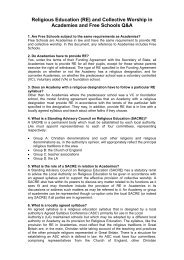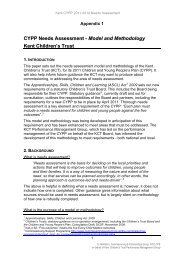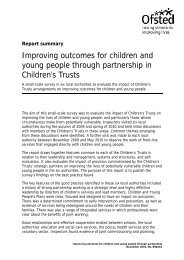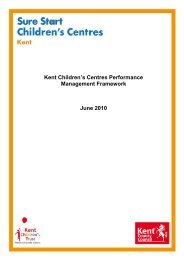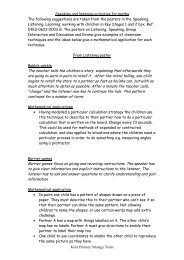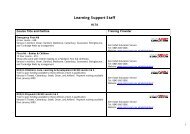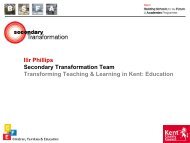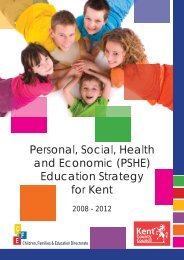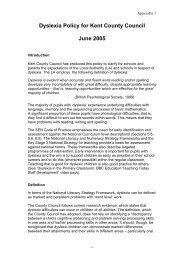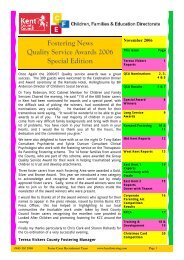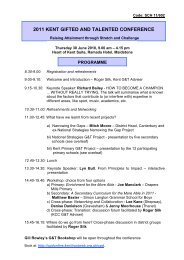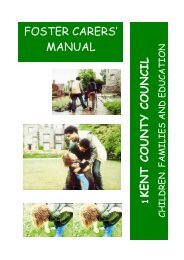Handy guide to... running a community chef project - Kent Trust Web
Handy guide to... running a community chef project - Kent Trust Web
Handy guide to... running a community chef project - Kent Trust Web
Create successful ePaper yourself
Turn your PDF publications into a flip-book with our unique Google optimized e-Paper software.
Venues and equipment<br />
The <strong>chef</strong> will need <strong>to</strong> have access <strong>to</strong> <strong>community</strong> venues providing cooking facilities <strong>to</strong><br />
run the cooking courses. These will need <strong>to</strong> be identified by partners before the <strong>chef</strong> is<br />
in post and hire rates (if applicable) negotiated, though hopefully partners will be able <strong>to</strong><br />
provide facilities for nothing or a nominal cost. Venues with cooking facilities may<br />
include early years’ settings, Children’s Centres, schools, youth clubs, churches,<br />
<strong>community</strong> centres, Healthy Living Centres, and homeless shelters.<br />
If local venues providing cooking facilities and equipment are limited the <strong>chef</strong> may need<br />
<strong>to</strong> be provided with portable cookers and equipment which will add <strong>to</strong> the cost of the<br />
<strong>project</strong>. Once in post the <strong>chef</strong> may also have some ideas about what equipment may<br />
need <strong>to</strong> be purchased so some budget may need <strong>to</strong> be held back.<br />
Recruitment<br />
It is worth involving the Food Partnership in the recruitment of the <strong>community</strong> <strong>chef</strong> <strong>to</strong><br />
encourage the members <strong>to</strong> engage with the <strong>project</strong>. In <strong>Kent</strong> partnerships were tasked<br />
with creating the job description and advertising, interviewing and selecting the two<br />
<strong>chef</strong>s.<br />
As a <strong>guide</strong> the <strong>chef</strong>s were required <strong>to</strong> have:<br />
at least five years experience of working in a catering environment<br />
experience of working with a cross-section of organisations and communities,<br />
including disadvantaged groups<br />
good working knowledge of principles of healthy eating and the national healthy<br />
eating agenda<br />
basic catering qualification and Basic Food Hygiene Certificate<br />
excellent communication and interpersonal skills.<br />
The first stage of the recruitment involved shortlisted candidates conducting an<br />
interactive cooking demonstration with an audience including future users i.e. elderly,<br />
children, people with special needs and professionals such as Environmental Health <strong>to</strong><br />
assess working practices. Successful candidates were then invited <strong>to</strong> interview<br />
conducted by a small panel of key partners who then based their decision on the<br />
cooking demonstration, audience feedback and interview.<br />
Who should cooking courses be aimed at?<br />
Almost any <strong>community</strong> group can benefit from a cooking course. The two <strong>chef</strong>s in <strong>Kent</strong><br />
ran courses with a variety of groups such as families, school children of all ages,<br />
adolescents, teenage parents, dads, homeless groups, pensioners, and British Minority<br />
Ethnic groups. Courses were adapted <strong>to</strong> suit the group so for instance the <strong>chef</strong> ran a<br />
beer and curry course for dads while concentrated on healthy weaning foods for parents<br />
of babies. Each course ran weekly for 6-8 weeks and lasted a couple of hours.



